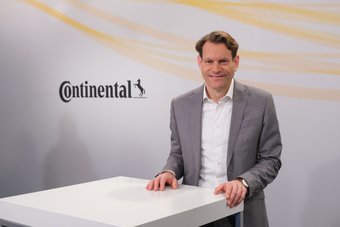Winning the Transformation: Continental Presents Realigned Strategy
- Three strategic cornerstones: strengthen operating performance, differentiate our portfolio, turn the change to connected and sustainable mobility into an opportunity
- Strategic mid-term targets: adjusted EBIT margin: around 8 to 11 percent; annual organic growth: around 5 to 8 percent; ROCE: around 15 to 20 percent; cash conversion ratio: more than 70 percent
- Continental CEO Nikolai Setzer: “With our future-oriented technologies and our success-driven, global team, we will be among the winners of the transformation in the mobility industry.”
Hanover, December 16, 2020. In view of the transformation in the automotive industry and growing demand for sustainable, emission-free mobility, Continental is realigning its profitable growth course. As part of its Capital Market Days, the mobility supplier is today presenting its realigned strategy, with which it aims to achieve annual organic growth of around 5 to 8 percent on average in the mid-term, thus outpacing its underlying markets and industries. In its Automotive Technologies group sector, for example, Continental plans in the mid-term to exceed the expected average market growth of around 5 to 7 percent per year by around 2 to 4 percentage points. The aim is to achieve an adjusted EBIT margin for the Continental Group of between around 8 and 11 percent (excluding Powertrain Technologies).
“The future of mobility is characterized by its high degree of connectivity and safety as well as its convenience – regardless of the vehicle’s drive system. While hardware is still important, software will increasingly make the difference in the future. With our future-oriented technologies and our success-driven, global team, we will be among the winners of the transformation in the mobility industry,” said Nikolai Setzer, CEO of Continental on Wednesday in Hanover, adding: “The three cornerstones of our strategy will be decisive in this respect: strengthening our operational performance, differentiating our portfolio with a focus on value creation, and turning the change to connected and sustainable mobility into an opportunity."
“Our strategy is clear and our mid-term targets have been set,” emphasized Continental CFO Wolfgang Schäfer. “Growth that outpaces our markets and industries, an adjusted EBIT margin of around 8 to 11 percent and a return on capital employed of around 15 to 20 percent illustrate our ambitious yet realistic growth path. In addition, with a targeted cash conversion ratio of more than 70 percent, we will further increase our financial strength in the future,” said Schäfer.
Differentiated portfolio strategy: faster growth and greater value
“In the mobility industry, we have a unique and strong product portfolio that is characterized by highly profitable and rapidly growing product areas. In combination with our expert team, this is the key to our success now and in the future,” explained Setzer, adding: “In the future, we will therefore align our product portfolio with our new strategy and our course for value-creating growth.” Continental will thus differentiate its entire portfolio between “growth” and “value.”
“Going forward, we will focus on our growth areas and future technologies with even more intensity and resources. This will ensure we grow faster than the market. At the same time, we will ensure that those products that have already established leading positions in a saturated market environment will remain profitable,” said Setzer. The portfolio strategy also includes possible acquisitions, divestments and partnerships.
Continental is focusing on above-average growth in the areas of connected, assisted and autonomous driving; software; new vehicle architectures with high-performance computers; the Tires and ContiTech business in high-growth regions; and digital solutions and services such as those for fleet and industrial customers. In doing so, Continental is drawing on its extensive expertise as a software company with more than 20,000 software and IT specialists.
At the same time, the company plans to systematically strengthen its leading market positions in profitable areas such as safety solutions, display and control systems, surface materials and the European passenger-car tire business, and to secure their value. In this way, Continental plans to generate sufficient funds for the competitive expansion of its growth areas geared to market and technology leadership.
With regard to the planned spin-off of its powertrain business, Setzer confirmed: “By the end of the year, the necessary organizational conditions will have been created as planned and the internal processes will have been reorganized. We therefore intend to carry out the planned spin-off of Vitesco Technologies as scheduled next year.”
Comprehensive roadmap for sustainable business practices
“The transformation in the automotive industry is extremely challenging due to its structural impact. We want to use this dynamic situation to our advantage. The transition to sustainable, emission-free mobility spurs us on to achieve new levels of performance and innovation,” said Setzer. With its sustainability roadmap published at the beginning of December, the mobility supplier is thus laying a solid foundation for sustainability like no other company in the supplier industry to date.
Part of the roadmap relates to emission-free vehicles: from 2022, Continental will make its global business for emission-free vehicles carbon-neutral. Continental’s comprehensive roadmap for sustainable business practices aims to achieve 100 percent carbon neutrality, 100 percent emission-free mobility and industry, a 100 percent circular economy and 100 percent responsible value chains – all by no later than 2050.
Operational performance: adjustment of cost structures and increased productivity
Continental is also ensuring its future viability and competitiveness by adapting its cost structure to global market conditions. As previously reported, these measures are part of its Transformation 2019–2029 structural program and were implemented in September 2019. In addition, the company is continuously improving its productivity, for example by increasing automation and digitalization in its production environment. In its plants, for example, Continental relies on over 2,000 collaborative robots and autonomous, driverless transportation systems – known as autonomous automated guided vehicles, or aAGVs for short. The company intends to produce the latter itself in the future, thanks to its extensive expertise in the fields of autonomous driving and electromechanics.
Automotive Technologies: safe, connected and convenient mobility
The strategy of the Automotive Technologies group sector focuses on the growing global demand for even safer, more connected and more convenient mobility and the technological basis required to meet this demand in the form of integrated vehicle architectures and increasingly comprehensive software.
Continental sees itself in a strong position to achieve faster organic growth in the mid-term in several of its automotive growth fields compared with global production volumes of passenger cars and light commercial vehicles (by around 3 to 10 percentage points in each case). These fields include products and systems for assisted and autonomous driving, services for automotive manufacturers, end and fleet customers as well as architecture, connectivity and software solutions. Crucial to this are, for example, high-performance computers that combine vehicle functions from the areas of safety, assistance, connectivity and entertainment. Continental is the first automotive supplier ever to supply such a central computer for the Volkswagen ID. series. In total, the mobility supplier has already received more than €4 billion worth of orders from several automotive manufacturers for high-performance computers.
The company also occupies a leading position with its products and systems for assisted and automated driving. For example, Continental will receive a CES Innovation Award in the USA in 2021 for its latest generation of particularly powerful radar sensors.
As one of the market leaders in the field of display and control systems, Continental won a CLEPA Innovation Award for its innovative 3-D display. In this environment, Continental expects slightly above-average growth of around 1 percentage point. The same applies to safety applications such as braking and restraint systems, for which improvements in the cost structure as well as portfolio adjustments to maintain competitiveness will continually be reviewed.
Overall, Continental expects its Automotive Technologies group sector to achieve annual organic growth of around 7 to 11 percent, thus exceeding the forecast average market growth of around 5 to 7 percent over the mid-term by around 2 to 4 percentage points annually. The adjusted EBIT margin is expected to be around 6 to 8 percent.
Vision 2030: growth through digitalization and sustainability in the tire sector
With its new Vision 2030 strategy program, the Tires business area intends to further consolidate its position among the world’s top tire manufacturers. With its premium portfolio in the car, truck and specialty tire segment, Continental will continue to stand for innovative top performance in tire technology. In the future, this will be supplemented by an ever-expanding range of services and aligned even more closely with the various customer segments.
In the mid-term, Tires is aiming for an adjusted EBIT margin of around 12 to 16 percent and a return on capital employed (ROCE) of more than 20 percent. Continental intends to further increase its market share in the growth markets of Asia and North America in particular. In the passenger-car tire segment, the global business with tires for electric mobility and ultra-high performance tires is to be systematically expanded further. The truck and bus tire business is to be further developed in all regions through the Conti360˚ fleet services. Continental’s specialty tire business, which includes not only two-wheel and racing tires but also tires for a variety of industrial applications, is expected to grow further as well, especially the agricultural tire segment.
With the tire segment having significantly increased its global market share under the preceding Vision 2025 strategy, the new strategy program aims to continue this success story. Smart, digital tire solutions and ambitious sustainability goals will also make a significant contribution to market success and differentiation in the future. In the area of service-based digital solutions, the Tires business area hopes to become the leading supplier worldwide by 2030. As one of the world’s largest tire manufacturers and suppliers of electronics, sensors and software for the mobility industry, Continental has a decisive competitive advantage here.
Continental is also pursuing ambitious goals in the area of sustainability and aims to become the most progressive manufacturer in the tire industry by 2030. Its focus will be on the strategic topics of climate protection, low-emission mobility, a circular economy and sustainable supply chains and thus all stages of the value chain. In order to make the tires of the future even more energy-saving and environmentally friendly in their production, use and recyclability, Continental is investing heavily in the research and development of new technologies, alternative materials and green production processes. By 2050, for example, the tire manufacturer plans to gradually modify its tire production so that it uses up to 100 percent sustainable materials. More information about Vision 2030 can be found in a separate press release.
ContiTech: intelligent solutions beyond rubber
The ContiTech business area continues to consistently and resolutely pursue the path it has been forging since 2017 in the direction of smart solutions beyond rubber. Specifically, ContiTech intends to grow around 3 percent points faster than the market in eight growth areas.
The growth potential results primarily from the increasing demand for digital and intelligent solutions in these future-oriented sectors. In doing so, ContiTech will draw on its long-standing and detailed knowledge of the industry and materials to open up new business opportunities by combining various materials with electronic components and individual services.
In particular, the company has strengthened its plastics expertise in both the industrial and automotive sectors with the acquisition of Merlett in 2019 and the joint venture with aft automotive launched this summer.
This trend is also being boosted by the development of sensor-based monitoring of conveyor belt systems using camera-equipped drones. Conveyor belts for example are inspected from the air on open sections of the conveyor. Once the drone has left the inspected site, it returns to an autonomous charging station to transfer the collected data to the designated cloud via an IoT (Internet of Things) module. The image data is processed by an AI-based algorithm and analyzed with regard to detected defects. In this way, flaws can be identified at an early stage, unplanned and cost-intensive downtimes can be reduced, and service periods can be scheduled according to requirements.
In addition, the ContiTech business area intends to further increase its value contribution, for example with applications for passenger cars, rail transport, the printing industry and mining. The business area thus plans to restore its adjusted EBIT margin to a range of around 9 to 11 percent in the mid-term. Its return on capital employed (ROCE) is expected to exceed 20 percent.
Please find here the Comments of the Executive Board - pdf (145KB) on the occasion of the press conference as part of the Capital Market Days 2020.
Press Pictures
As part of its Capital Market Days, Continental has presented its realigned strategy on December 16, 2020.







